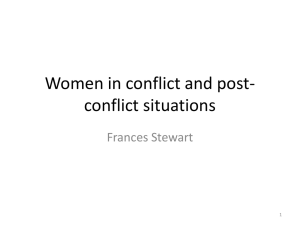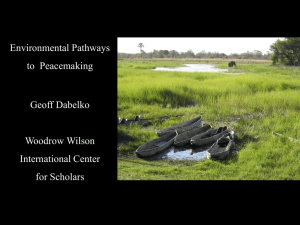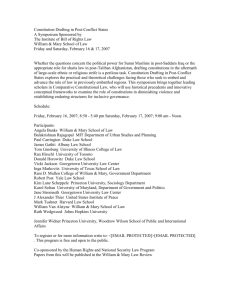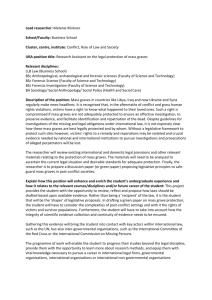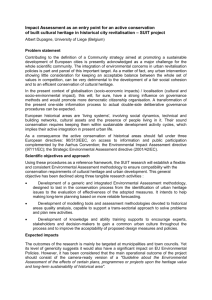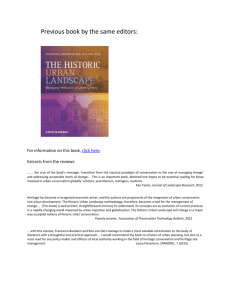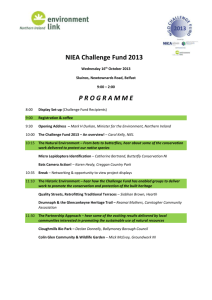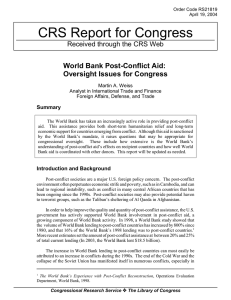Cambridge Post-Conflict and Post-Crisis Group
advertisement
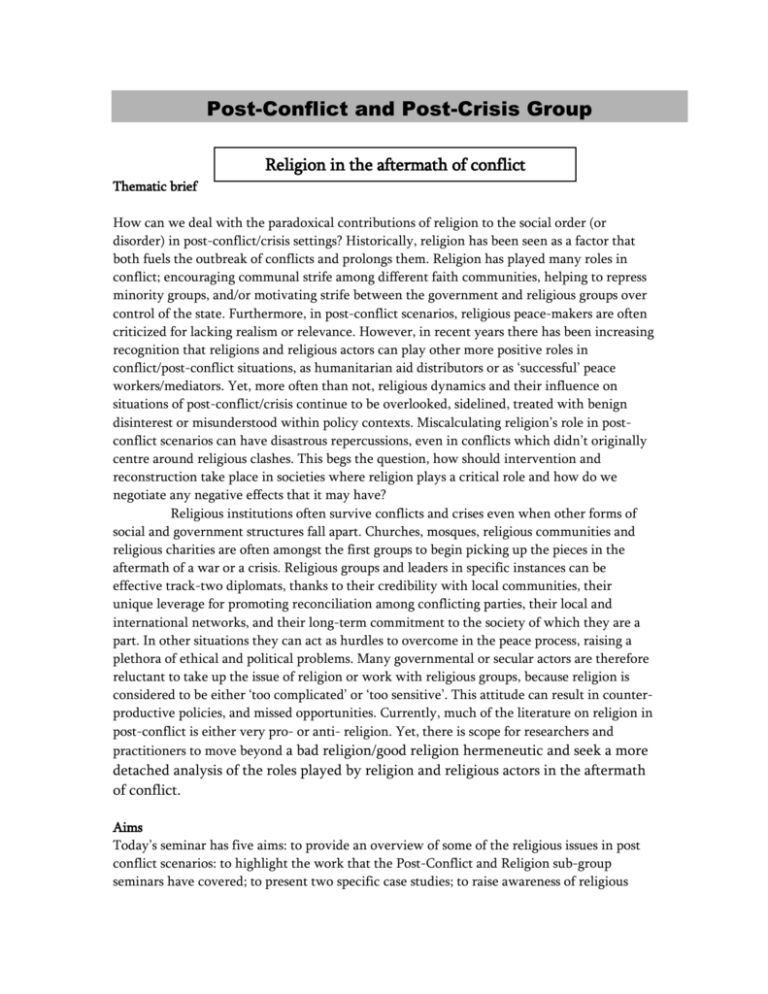
Post-Conflict and Post-Crisis Group Religion in the aftermath of conflict Thematic brief How can we deal with the paradoxical contributions of religion to the social order (or disorder) in post-conflict/crisis settings? Historically, religion has been seen as a factor that both fuels the outbreak of conflicts and prolongs them. Religion has played many roles in conflict; encouraging communal strife among different faith communities, helping to repress minority groups, and/or motivating strife between the government and religious groups over control of the state. Furthermore, in post-conflict scenarios, religious peace-makers are often criticized for lacking realism or relevance. However, in recent years there has been increasing recognition that religions and religious actors can play other more positive roles in conflict/post-conflict situations, as humanitarian aid distributors or as ‘successful’ peace workers/mediators. Yet, more often than not, religious dynamics and their influence on situations of post-conflict/crisis continue to be overlooked, sidelined, treated with benign disinterest or misunderstood within policy contexts. Miscalculating religion’s role in postconflict scenarios can have disastrous repercussions, even in conflicts which didn’t originally centre around religious clashes. This begs the question, how should intervention and reconstruction take place in societies where religion plays a critical role and how do we negotiate any negative effects that it may have? Religious institutions often survive conflicts and crises even when other forms of social and government structures fall apart. Churches, mosques, religious communities and religious charities are often amongst the first groups to begin picking up the pieces in the aftermath of a war or a crisis. Religious groups and leaders in specific instances can be effective track-two diplomats, thanks to their credibility with local communities, their unique leverage for promoting reconciliation among conflicting parties, their local and international networks, and their long-term commitment to the society of which they are a part. In other situations they can act as hurdles to overcome in the peace process, raising a plethora of ethical and political problems. Many governmental or secular actors are therefore reluctant to take up the issue of religion or work with religious groups, because religion is considered to be either ‘too complicated’ or ‘too sensitive’. This attitude can result in counterproductive policies, and missed opportunities. Currently, much of the literature on religion in post-conflict is either very pro- or anti- religion. Yet, there is scope for researchers and practitioners to move beyond a bad religion/good religion hermeneutic and seek a more detached analysis of the roles played by religion and religious actors in the aftermath of conflict. Aims Today’s seminar has five aims: to provide an overview of some of the religious issues in post conflict scenarios: to highlight the work that the Post-Conflict and Religion sub-group seminars have covered; to present two specific case studies; to raise awareness of religious issues in order to stimulate discussion, and, finally, to contemplate how the ideas presented today could be integrated into the June colloquium. Religion in Post-Conflict: an overview of main themes and the work of the Post-Conflict and Religion sub-group Lucia Faltin (Director of International Programs: The Centre for the Study of Jewish– Christian Relations; PhD student, Faculty of Divinity) Lucia will give an introduction to the work that the Post-Conflict and Religion sub-group has been involved in. She will highlight the question of why religion tends to be marginalized or entirely avoided in current post-conflict debate. Subsequently, she will explore some of the positive and negative ‘hats’ that religion is seen to have had in post-conflict situations. Finally, she will ponder on the differences between US and EU approaches to religion in postconflict scenarios. Integrative complexity coding: A tool to asses the quality of post-conflict reconciliation Dr. Jose Liht (Psychology and Religion Research Group, Faculty of Divinity) Integrative complexity has established its usefulness as a predictor of the type of resolution international crises take. The methodology and literature on integrative complexity coding will be discussed in regards to its potential to evaluate the quality of post-conflict reconciliation. A preliminary study design that examines several conflicts in which some kind of closure has happened, ranging from successful peace to cold war, will be presented in order to test the technique's usefulness and elicit feedback from peers. Managing religious heritage in a post-conflict setting- Angkor Wat and Vukovar Britt Baillie (PhD candidate, Department of Archaeology) Using the case-study of religious sites in Cambodia and Croatia, I seek to highlight some of the ways that religion is ‘dealt with’ in post-conflict scenarios. Heritage management and conservation have traditionally worked with safely ‘dead’ heritage of civilizations which have long since disappeared. These disciplines are less well equipped however, to deal with living religious sites and their inhabitants and users. Religious heritage was specifically targeted during the civil wars in the Former Yugoslavia and Cambodia. In the aftermath of these hostilities, international and national agencies have been struggling to manage this wardamaged heritage. The conflict between secular ideas of conservation, development, tourism, urban planning and the needs of religious groups in these historic sites has been brought into fine relief by this process. The way that these religious sites have been handled by secular government agents has weakened the development and reconstruction process in both locations. This paper will explore how and why this is the case and suggests how it can be avoided in future. Discussion questions How does one contain the damage done by organized religions in the context of war? When does engagement by religious groups crystallize ethno-religious differences? When does it help to bridge the divide between ethno-religious groups? What are the effects of introducing a non-‘native’ religious ‘peace building’ groups into a post-conflict/crisis situation who are more concerned with proselytizing than solving local problems? How can inter-faith peace building work between religious communities which are more concerned with their spiritual particularities than with resolving common political or economical problems? What are critical gaps in the current approach(es) to religion in the aftermath of conflict? What are the costs of overlooking religions’ role in post-conflict settings? Why is religion marginalized as a peripheral humanitarian or cultural issue in postconflict scenarios? What attitudes shape governmental, NGO, religious organizations attitudes towards religion and conflict and how do these attitudes differ? Can initiatives with a secular analysis or outreach respond effectively to actors with a theologically based worldview? Suggested readings: General Byrnes, T.A. & Katzenstein, P. J. (eds) (2006) Religion in an Expanding Europe. Cambridge: UP. Danan, L. (2007). Mixed Blessings: U.S. Government Engagement with Religion in ConflictProne Settings. Washington DC: Centre for Strategic and International Studies. Faltin, L. & Wright, M. (eds) (2007) The Religious Roots of Contemporary European Identity. London & New York: Continuum. Gopin, M. (2000) Between Eden and Armageddon: The Future of World Religions, Violence, and Peacemaking. Oxford: Oxford University Press. Helmick R.G & R.L. Petersen (2001). Forgiveness and Reconciliation: Religion, Public Policy and Conflict Transformation. London: Templeton Foundation Press. Johnston, D. & Sampson, C. (eds) (1994) Religion, The Missing Dimension of Statecraft. New York: Oxford UP. Smith, A.D. (2003) Chosen Peoples: Sacred sources of national identity. Oxford: Oxford University Press. Integrative complexity coding: Baker-Brown, G., Ballard, E. J., Bluck, S., de Vries, B., Suedfeld, P.& Tetlock, P. E. (1992). The conceptual/integrative complexity scoring manual. In C. P. Smith (Ed.), Motivation and personality: Handbook of thematic content analysis (pp. 401–418). Cambridge, UK: Cambridge University Press Conway, L. G. III, Suedfeld, P., & Tetlock, P. E. (2001). Integrative complexity and political decisions that lead to war or peace. In D. J. Christie, R. V. Wagner, & D. Winter (Eds.), Peace, conflict, and violence: Peace psychology for the 21st century (pp. 66–75). Englewood Cliffs, NJ: Prentice-Hall. Liht, J., Suedfeld, P., & Krawczyk, A. L. (2005). Integrative complexity in face-to-face negotiations between the Chiapas guerrillas and the Mexican Government. Political Psychology, 26, 543-552. Suedfeld, P., Guttieri, K., & Tetlock, P. E. (2003). Assessing integrative complexity at a distance: Archival analyses of thinking and decision making. In J. M. Post (Ed.), The psychological assessment of political leaders: With profiles of Saddam Hussein and Bill Clinton (pp. 246–270). Ann Arbor: University of Michigan Press. Tetlock, P. E. (1985). Integrative complexity of American and Soviet foreign policy rhetoric: A time-series analysis. Journal of Personality and Social Psychology, 49, 1565–1585. Religious Heritage in Post-Conflict Scenarios Baillie, B. (2008).Conservation of the sacred at Angkor Wat: further reflections on living heritage, Conservation and Management of Archaeological Sites, Volume 8, Number 3, 2007 , pp. 123-131(9). Layton R. (2001). Destruction and Conservation of Cultural Property. Routeledge: London. Miura, K. Conservation of a ‘living heritage site’. A contradiction in terms: a case study of Angkor World Heritage Site. Conservation and Management of Archaeological Sites 7.1 (2005) 3-18. Stanley-Price, N. 2007. Cultural heritage in postwar recovery. Papers from ICCROM Forum held in October 4-6, 2005, Rome. ICCROM Conservation Studies; 6
